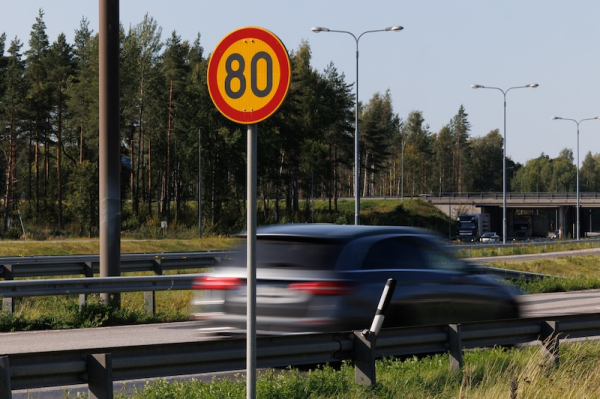
Photo: Anni Savolainen / Lehtikuva
- Previous Article Finland sends Ukraine €90 million in ammo funded by frozen Russian assets
- Next Article Wind and drought raise wildfire risk as cold front moves into Finland
Thousands of foreign drivers caught speeding by automatic cameras in Finland each year escape without consequences, as police are unable to process traffic penalty fees across borders.
Chief Inspector Dennis Pasterstein, head of the National Police Board’s traffic surveillance unit, said the law allows authorities to issue fines to foreign-registered vehicles. But in practice, the process stops at the camera.
“If the system detects a foreign registration, the case is considered closed and no penalty is issued,” Pasterstein said.
He explained that technical limitations in Finland’s current IT infrastructure prevent the police from accessing foreign vehicle registries. This means traffic penalty fees, which range from 20 to 200 euros, are not collected unless a driver is caught in person.
“There’s no obligation under EU law to send these fees abroad,” he added. “Each country decides for itself whether and how it wants to pursue these cases.”
While the traffic penalty fee is not classed as a criminal fine but as an administrative sanction, it applies to various minor offences such as low-level speeding. For more serious violations, such as driving more than 21 kilometres per hour over the limit, police can still issue criminal fines, including to foreign drivers, particularly during roadside stops.
Pasterstein said Finland does not keep statistics on how many such foreign-registered vehicles escape sanctions, but the number is believed to be significant.
“We estimate the number of unissued penalties is in the thousands annually,” he said.
Efforts are under way to change the situation. Pasterstein noted that Sweden and Estonia are likely to be the first countries to receive cross-border fines once technical systems allow it.
“Most foreign vehicles in Finland are from those countries, so it makes sense to begin there,” he said. “After that, we can look at expanding the practice.”
He added that calculating the amount of revenue lost is not the responsibility of the police.
“We don’t keep track of fine income. That’s not our task. Our job is enforcement — others count the money,” he said.
The police hope that improvements in data exchange and registry access across the EU will eventually close the current loophole and improve compliance with traffic laws regardless of number plates.
HT
- Previous Article Finland sends Ukraine €90 million in ammo funded by frozen Russian assets
- Next Article Wind and drought raise wildfire risk as cold front moves into Finland
Source: www.helsinkitimes.fi
